BMW R 1300 GS review: Iconic ADV reimagined
The new R 1300 GS is radically different and makes no apologies for it.
Published on Jun 13, 2024 12:30:00 PM
14,589 Views
Follow us on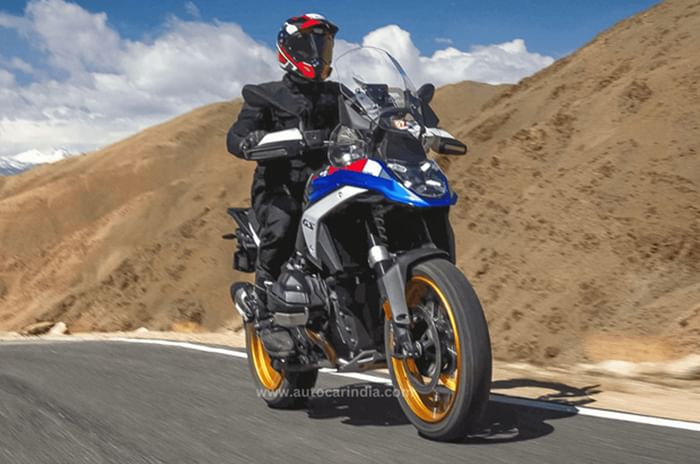
Drastic change is rarely a comfortable thing, especially when the item in question has a cult following. But that hasn’t deterred BMW from taking the GS down a path that will rattle some cages. After a day’s ride in spectacular Ladakh, there’s no doubt that the new 1300 GS is a better motorcycle, but it's not as clear yet whether some of those changes contribute towards making it a better GS.
BMW R 1300 GS design, ergonomics
The internet typically needs to be enraged about something or the other, and in this case, they’ve fixated on the headlamp. My opinion is that it's no thing of beauty, but I certainly don’t find it offensive either. And let's remember, the gawky asymmetric headlamp on the older versions also met plenty of hate at first, but now everyone is apparently in love with it and misses it terribly. We’ll see if history will repeat itself.
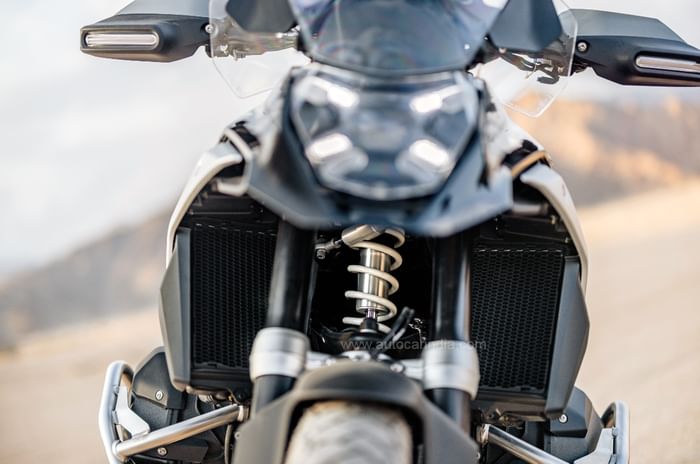
To my eyes, this is a handsome, proportionate design and it's still very much a BMW GS with that huge engine dominating the proceedings. While the new bike is certainly a lot sleeker than the 1250, there's no compromise on protection from the elements. With temperatures ranging from 4-degC to 16-degC all day long, the 1300 kept me cosy and amazingly well-shielded from the biting cold wind.
The new windscreen is now electronically adjustable and it worked very well with pretty much no buffeting up to early triple digit speeds. That being said, though it was quite noisy in its highest setting, it got significantly quieter if I ducked down by a couple of inches. I'm just over 6 feet tall so shorter riders will probably find no issue here.
BMW R 1300 GS manageability for shorter riders
What shorter riders will have a sizable problem with is the height and heft of this motorcycle. At 237kg, the bike is 12kg lighter and you will definitely feel the benefit of that on the move, but at parking speeds, this still feels intimidatingly large and heavy. In fact, while the seat height is the same 850mm as before, the new bike certainly feels taller than before. A couple of 5’6’ tall riders who could just about manage on the 1250 were visibly less comfortable on the 1300.
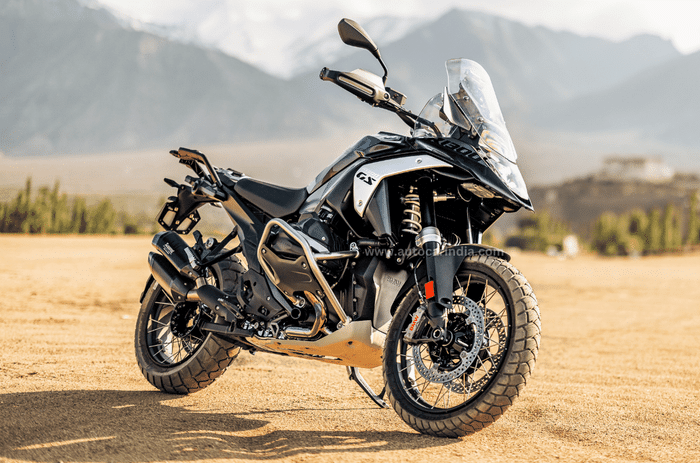
Thankfully, there is a fix for this if you buy the Triple Black 2 variant in India. This variant is available with BMW’s adaptive ride height (ARH) system that drops the suspension by 30mm in just 1.5s as you slow below 30kph. The suspension automatically rises back up above 50kph in about 3s, which means that the bike won’t lose any dynamic capability as it would have were it on a traditional suspension lowering kit. This technology also brings in a ‘jacking’ feature, which slowly raises the suspension at both ends when you try putting the bike on the centre stand. This significantly reduces the effort required.
The ARH equipped demo bike we got to sit on felt as low, if not lower than the 1250, and I suspect this will be a popular option. Unfortunately, as of now, ARH can’t be equipped on any other model in India.
BMW R 1300 GS ride and handling
Build a little speed and all the above concerns disappear because this GS has a new found set of dynamic capabilities that its predecessors could only dream of. The sheet metal chassis and cast alloy subframe are completely fresh designs and there’s also the new Dynamic Suspension Adjustment (DSA). This uses a clever new technology where an auxiliary spring in a gas-charged canister comes into play as needed. Basically, it allows the electronic suspension to switch between two spring rates based on the requirement – that’s a world first.
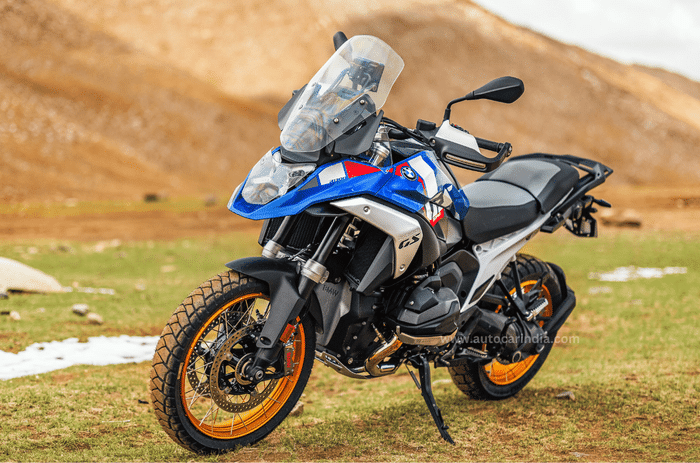
The front Telelever Evo suspension uses a similar design concept as before, but with huge upgrades. One of the key improvements is a more rigid connection between the handlebar and the telescopic fork element, which improves front end feel. On the old 1250, you could throw the bike into a corner but you had to completely trust its (considerable) ability to get around it, because there really wasn’t much feedback for the rider. Since the new one retains that unique anti-dive front monoshock design, it still doesn’t have as connected a feel as a Multistrada V4, but the GS now has a much more voracious appetite for corners and it feels a lot more eager to attack them.
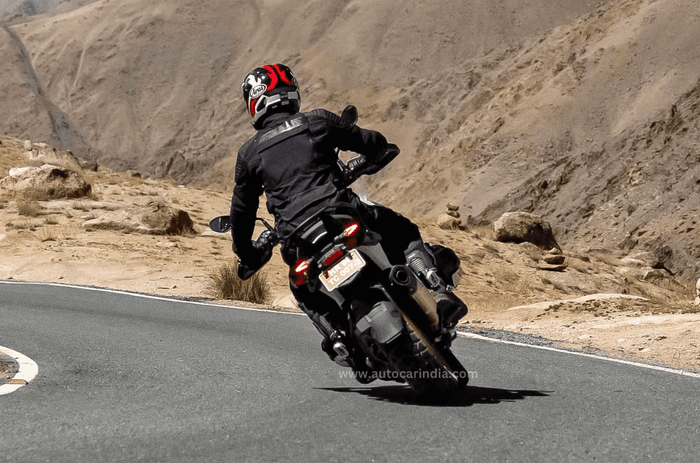
The way the bike transitions from vertical to full lean is also more linear and natural feeling than before. It was so much fun that I found myself wondering how close I could get the cylinder heads to the road. The answer arrived when the rear tyre eventually lost traction mid corner, but it did so in a pleasantly progressive and controlled manner. Between the bike’s stable chassis setup and its excellent electronic assists, it was nowhere close to as pant-browning a moment as it should have been.
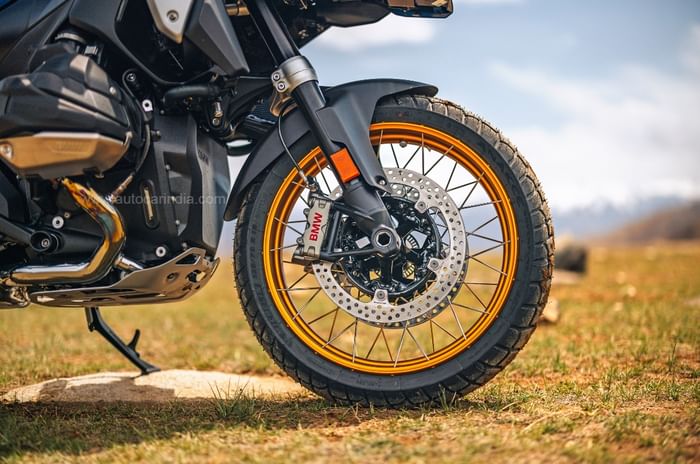
One of my few issues with the 1250 was its brakes, which needed a bit more effort than I’d like. A new Brembo setup completely solves that on the 1300, with just the right balance between performance and effortlessness. The increased front-end rigidity surely has a positive effect here as well.
BMW R 1300 GS ride comfort
The 1300 GS’ new found focus on sporty riding can also be seen in other things like the revised handlebar ergos, which are still comfy, but slightly lower than before. Then there’s the fact that the new seats have gone rather firm and have lost that overt plushness of the old bike. They don’t feel as comfy as before, especially for the pillion.
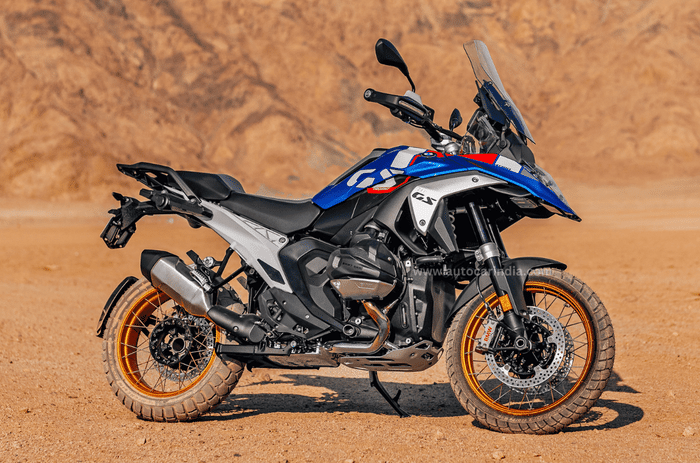
The bike also seems to have lost some of that detached, almost Volvo bus-like feel in its ride quality. We do need to spend some more time playing with the damping settings and on more varied road conditions (the roads we rode on were mostly superb). But in its standard setting, this suspension isn’t quite as squishy-plush as before and seems to have a more connected feel to the road.
On most motorcycles, more feel and feedback is a good thing, but one of my favourite aspects of the GS was its wonderfully floaty feel that isolated the road and kept you fresher for longer. On the 1300, the suspension was absolutely comfortable, but I was more aware of the road than I’d have liked. We’ll reserve final judgement on this till we get to properly test the bike back at home base.
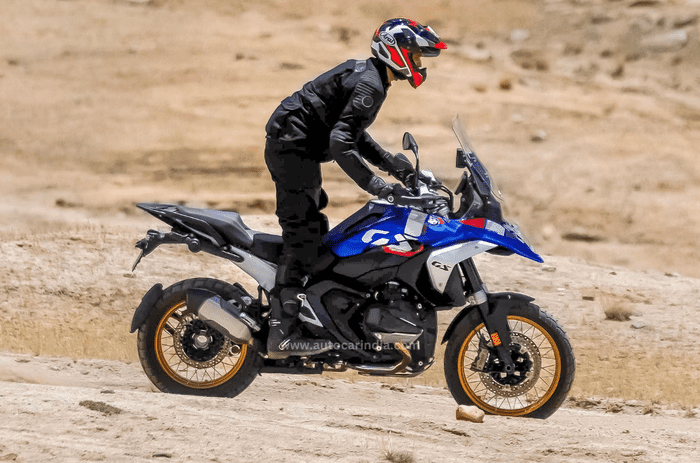
Having gone from 0-15000+ feet in about 24 hours, I was feeling the effects of the altitude, and was quite relieved that BMW had very little off-roading for us to experience. In the 500-odd-metre sandy patch that we got to play with, the sensation was that the front end returns more feedback to the rider, which is good. As for the suspension, it has the same 190mm/200mm of front/rear travel as before, but it did feel a little on the firm side in terms of how much it could absorb rocky surfaces. BMW has an optional Sport suspension setup with 20mm more travel at both ends, which international reviews say makes a big improvement in off-road capability, but that is not currently available in India.
BMW R 1300 GS engine, performance
Clearly, there are many aspects of this bike that we need to experience more thoroughly, including highway cruising, off-road ability, city riding and the overall performance. But even at this power-draining altitude, the new 145hp/149Nm boxer engine is a powerhouse, and it feels quicker when ridden back to back with the 1250 GS.
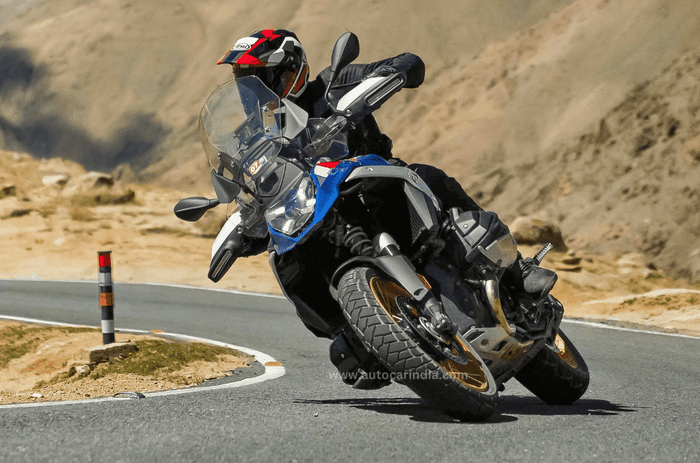
Thankfully, low-end response is still strong and the engine doesn’t grumble even as low as 1,500rpm. The motor starts to seriously build pace as low as 3,000rpm and it feels lighter/quicker revving in its nature, although the redline is at the same 9,000rpm. Fuelling is good although throttle response is sharper than before and I preferred knocking it back into Rain mode when carrying a pillion because even Road mode was a bit too reactive for smooth, gentle riding.
We’ll have to wait to report on how fast this engine really is as it would have lost about 30 percent of its power on the climb to Wari La pass (17,450 feet at the top, although we didn’t go all the way up). But I can confirm that it’s now smoother, particularly so at higher revs. The old motor did feel a little vibey and stressed when fully revved out, and this one is more relaxed in that regard.

Highway cruising should also be serene and 100kph in 6th gear comes in at just 3,500rpm. BMW claims that this engine is similarly efficient as before, but the fuel tank size has reduced from 20 to 19 litres, so expect a small drop in range. As for the exhaust sound, it’s quite similar, but a little smoother and with a hint less of the 1250’s rorty blat.
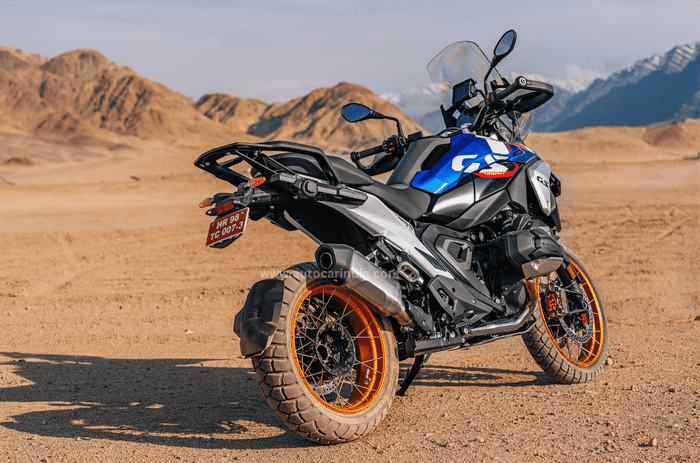
At 13.3:1, this new motor has a higher compression ratio than even an S 1000 RR, but the recommended fuel is a sensible 95 octane. There’s a brand new gearbox as well, and while the shift quality leaves nothing to complain about, the big improvement is in the new quickshifter that takes much less effort than before.
BMW R 1300 GS features, riding aids
One of the few things that has not changed on the new GS is the TFT display and that’s fine because BMW’s display is one of the most legible and easy to use units in the industry. The switchgear is mostly the same as well, although there’s a new start button and the ignition button has moved from under the handlebar to the right side switch cube.
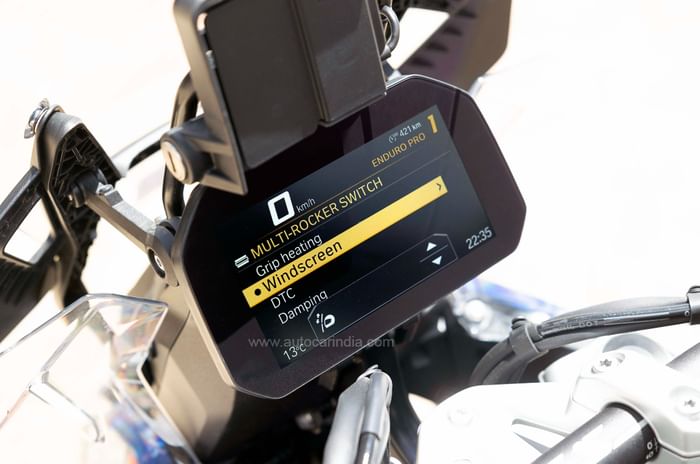
There’s also a convenient new button on the left that quickly gets you to a customisable menu of items that you’d want to mess with while on the move – windscreen, heated grips, traction control and suspension damping.
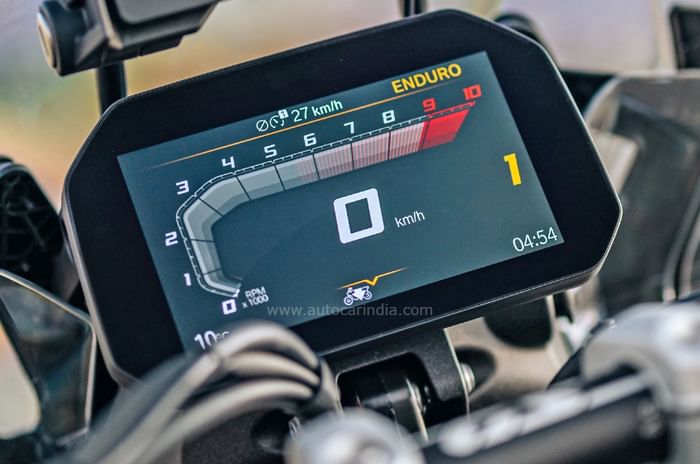
You have the usual array of riding modes and rider assists as well as a new, linked ABS system that brings the other end into action whenever you apply either just the front or rear brake. There’s also a dizzying bunch of features that apply depending on which of the five trims you select from.
BMW R 1300 GS variants, pricing
All bikes sold in India will have cross-spoked tubeless wheels as standard as well as the Comfort and Dynamic packages, which bring things like the electronic windscreen, quickshifter and pro riding modes. Moving to Triple Black 1 gets you the Touring package as well, and Triple Black 2 brings in the Adaptive Ride Height suspension. The GS Trophy variant gets a cool Blue and White livery along with similar equipment to Triple Black 1. Finally, there’s the range topping Option 719 Tramuntana, which has various milled metal components as well as radar-assisted safety features. It can be a bit overwhelming and you’ll want to study the website or visit a dealership to fully understand the model line-up.
The R 1300 GS has been launched at a starting price of Rs 20.95 lakh, which is just 40,000 more than the outgoing R 1250 GS. From a value standpoint that is quite appealing, and it places the GS a little higher than the equivalent Triumph Tiger 1200, but much lower than both the Ducati Multistrada V4 and Harley-Davidson Pan America 1250 Special.
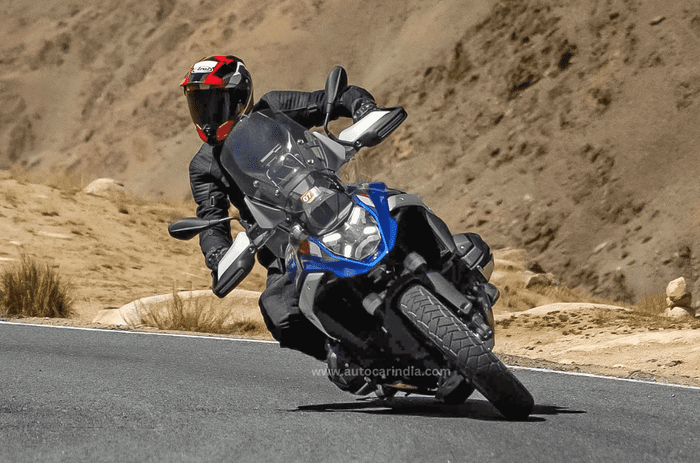
Ultimately, this bike has taken on more of a sporty, road-focused character and that is likely to appeal to new customers who weren’t fans of the existing GS image. At the same time, existing GS fans may feel a bit alienated by this bike, and that’s something they’ll just have to get over. For now though, this ride has only revealed a limited amount of what this tremendously capable bike is about and I’m keen to see what sort of final impression it creates in the real world.
Tech Specs 
Copyright (c) Autocar India. All rights reserved.


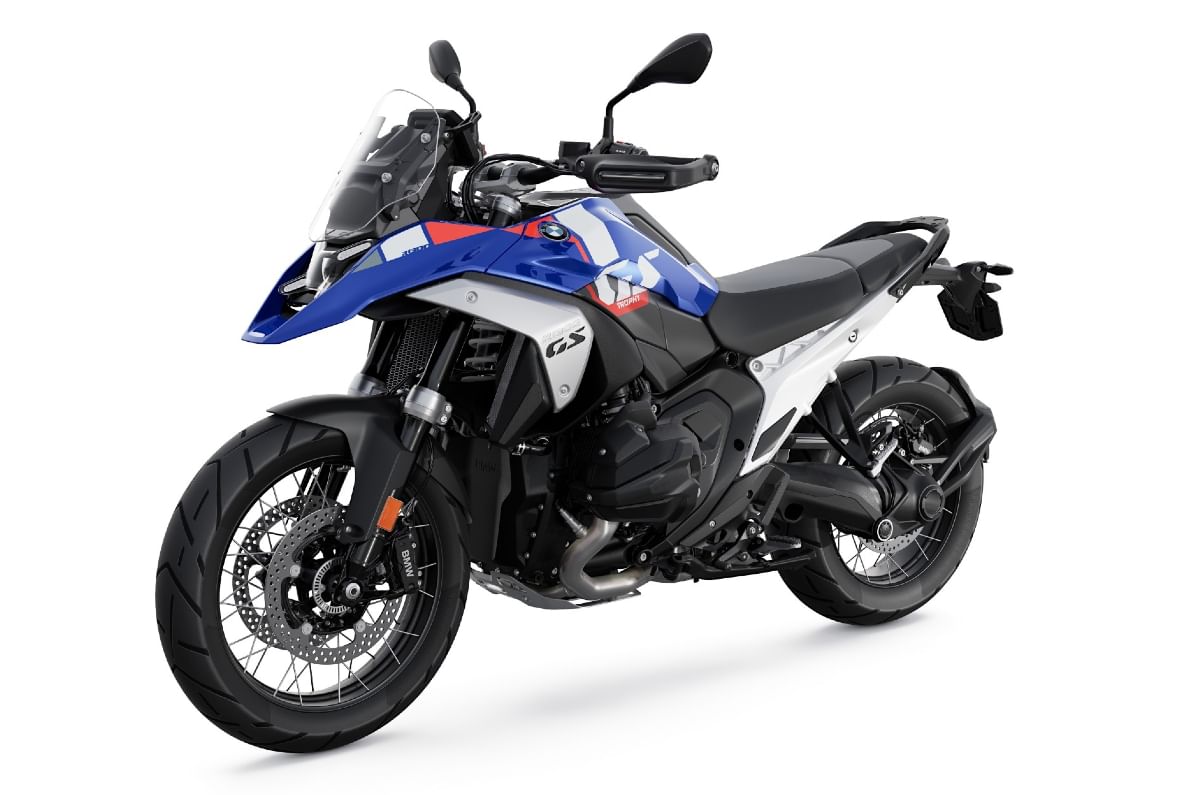
 Wheels and Tyres
Wheels and Tyres Feature Checklist
Feature Checklist Dimensions & Chassis
Dimensions & Chassis Engine
Engine Transmission
Transmission Suspension
Suspension Brakes
Brakes
Comments
Member Login
Personal Details
No comments yet. Be the first to comment.